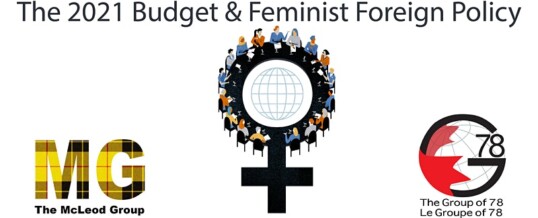
McLeod Group blog by Morgane Rosier and Stephen Brown, April 26, 2021
The foreign policy content of the Canadian government’s long-awaited Budget 2021 is disappointing, especially in light of the government’s claims to be delivering a specifically feminist foreign policy. In this blog, we summarize three common threads from the “hot takes” provided by experts in the fields of trade, aid, diplomacy, defence and environment during an online event co-hosted by the Group of 78 and the McLeod Group on April 21. Overall, the specialists found that the budget lacks clarity in its financial information, takes a “business as usual” approach to overlapping crises, and does little to promote – and even risks worsening – the situation of women, girls and marginalized people around the world.
First, the massive 725-page-long budget document (865 pages in French), released on April 19, is often unclear on how much has already been spent, how much is being reallocated and what constitutes a new commitment. This lack of transparency is at best unhelpful and at worst can be misleading. For instance, it mentions $1.4 billion in international assistance over five years, but it is unclear how much can actually be counted as official development assistance in line with the standard definition.
One of the biggest increases under that category is a one-year extension of Canada’s Middle East Strategy. The budget announces $527 million for that purpose, but the fine print mentions $237 million in “funds sourced from existing departmental resources”, so the real increase is actually $290 million. Those funds will be split among the Department of National Defence, Global Affairs Canada, the Canadian Security Intelligence Service and the Communications Security Establishment, and some will be used to provide military support and fund counterterrorism. How much will actually go towards development assistance is impossible to tell.
Second, despite bold new domestic initiatives such as nationwide subsidized childcare and a commitment “to achieve 25 per cent land and marine conservation targets by 2025”, the budget’s international dimension is uninspiring. For instance, Canadian commitments on trade are in line with the decades-old Washington Consensus, as they continue to focus on the promotion of free trade. The budget’s premise is limitless economic growth, which is blind to the ongoing ecological crisis and the unsustainability of current economic models.
In the same vein, ten times more money is allocated to the military than to Environment and Climate Change Canada. The government keeps increasing amounts for defence, including its commitments to the North Atlantic Treaty Organization (NATO) and $19 billion for the purchase of fighter jets, in what would be the second most expensive government procurement program ever.
Despite the announced increases in the area of foreign aid, Canada will continue to be a below-average donor in terms of generosity. They are also focused on a short-term boost, especially in emergency assistance, rather than medium or long-term commitments to reducing poverty and tackling its root causes. Canada needs a new, long-term vision for the post-pandemic world that integrates peace, human rights and environmental concerns. Instead, the budget only offers more of the same.
Third, the international dimensions of the budget are not in line with the government’s own feminist aspirations. The budget’s descriptions of foreign aid initiatives barely even mention women or gender equality, despite their being at the core of the government’s 2017 Feminist International Assistance Policy. It is especially hard to reconcile claims of a feminist foreign policy with support to NATO, the purchase of weaponry, mentioned above, and ongoing practices such as arms sales to countries like Saudi Arabia.
In spite of the government’s claims to have adopted a gender lens and a feminist approach, the budget could deepen some inequalities. Trade, for instance, is not gender neutral. Existing trade policy will not have a positive impact on women and gender-diverse people and other marginalized groups unless robust measures are taken to address deeply entrenched gender inequalities. The budget provides an additional $16 million to the Canadian Ombudsperson for Responsible Enterprise, whose role is to promote ethical social and environmentally responsible practices by Canadian corporations operating abroad. But the ombudsperson’s office is toothless and lacks the power to investigate or hold the companies accountable, including for the negative gendered and environmental impact of Canadian corporate activities.
Overall, despite many important innovations in domestic policy, the budget fails to provide any indication of a clear, long-term, coherent, ambitious vision for foreign policy informed by an intersectional lens. The current multidimensional global crisis makes an ambitious new approach all the more urgent. Instead, the perspective detailed in the budget will help to maintain the status quo for women and other marginalized groups, and even to worsen some existing inequalities. Regrettably, at the international level, Budget 2021 falls far short of its promise to achieve a “feminist and inclusive recovery”.
Morgane Rosier is a Ph.D. candidate at the School of International Development and Global Studies, University of Ottawa. Stephen Brown is Professor of Political Science at the University of Ottawa.
